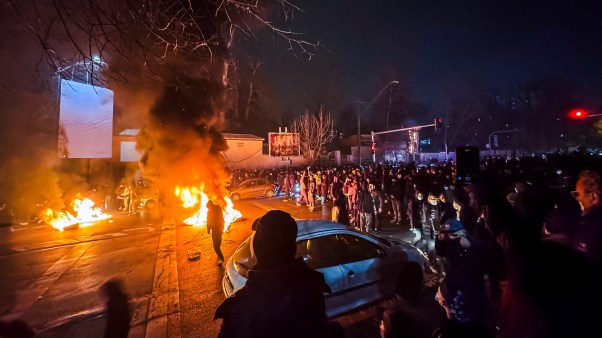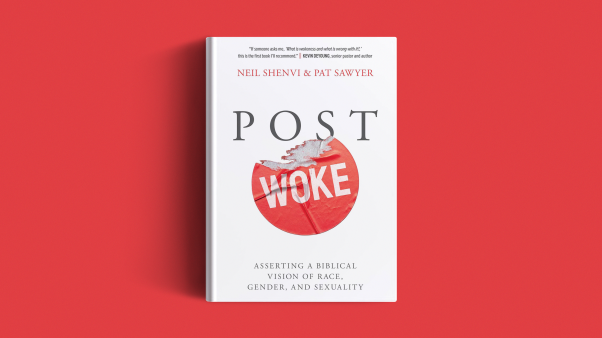Ever felt like you were going nowhere? That’s what I felt a few years ago while traveling deep into the desert with an enthusiastic young couple from Urban Mosaic, our worship celebration in a nightclub just west of downtown Los Angeles, to oversee an outdoor experience they called “Walking through the Valley of the Shadow of Death.”
The idea: Invite people to travel with some sort of percussion instrument three hours into the desert. Worship and talk through the night, and be there to greet the sunrise. As they first described the event, I thought, Will there be toilets? Will this be evangelistic? And did I mention toilets?
“Why not?” I said. At the very least, I’d be able to spend time with up and coming leaders, as well as to watch a dynamic couple from a “rave” background put an event together.
A few weeks later we loaded a Jeep Montero and followed our map to a designated site in the desert. The last third of the three-hour trip was on off-road “lanes” in the desert. No road signs, only landmarks and approximate mileage from one marker to another.
I recalled as a young boy asking my mother to explain camping to me. “I think,” she answered in her beautifully accented English, “that’s when people sleep at night in the dirt.”
As we drove deep into the desert night, I realized that’s exactly where I was going, “camping.”
Finally, in the distance, we spotted a fire and knew we had arrived. Not at a desert resort. Not even at a campsite—just an isolated place in the desert. It’s difficult to express the significance of arriving “nowhere”—and believe me, this was nowhere—for the sole purpose of being with others. From the site, we watched for hours the distant lights of car after car struggling to make their way through the desert.
I looked around at the accommodations: logs around the fire pit, some beach chairs, blankets, and some tents pitched around the perimeter. To one side of us was open desert, to the other side, forming a natural amphitheatre, a wall of rock rising high into the sky.
Stark beauty, but uncomfortable, I thought. This has all the makings of a disaster. What would people be expecting as they left Los Angeles after a hard week of work? Would they be let down when they arrived nowhere?
I was reminded as I watched newer and younger leaders arrive and begin to connect with each other that the hunger for community is deeply embedded within the human make-up.
Being “nowhere” didn’t matter because everyone was there for the same thing, to be with others. No running water. No electricity. No shelter. Indeed, no toilets. Nothing but people in the desert, under starlight, with a real sense of belonging. Young leaders—like leaders of all ages—want relationship, not just responsibility.
Wouldn’t it have been enough to have coffee together at the local café? Not for these guys. There’s no novelty in a coffee shop and it’s, well, too convenient and urbane. The type of community they sought was far more costly, primal, and adventurous. Part of the experience of longing for community was being vulnerable enough to show how far you will go to connect with others.
One of my reservations had been a sense that the event was not as intentionally evangelistic as I would have liked. But they brought to the desert the kind of friends Jesus is looking for. The longing for community is not just felt within the church. It is a universal hunger.
As nature would have it, a scorpion stung one of our guests, a young lady from France. And yes, she came to Christ that weekend as a result of the care of the community. None will forget how God met us in the desert.
How new leaders connect
Young leaders care about community and about context. Our postmodern context is not about the style of worship celebration and even less about the facilities. Mission today is about creating community that cares for the world in the way God does. Jesus is the only one who knows this kind of community, and thus everything begins with him.
Today there are a lot of consultants pushing candles and stained glass as the recipe for reaching postmodern people. My 14-year-old yawns at these prescriptions. Take note: newer, younger leaders may not want to simply manage the programs and structures others have created.
New leaders may envision ways to be faithful to the mission of Christ that are worlds apart from what has preceded them. But if we follow them, they may create opportunities to reach those outside our churches for Christ.
If we’re wise, we’ll listen and pour ourselves into what the spirit is doing rather than pushing new leaders into what we’ve always done.
Even if it takes you into the desert in the middle of the night.
Alex McManus is a leader at Mosaic, a church in Los Angeles.
Copyright © 2003 by the author or Christianity Today/Leadership Journal. Click here for reprint information onLeadership Journal.









